Related Research Articles
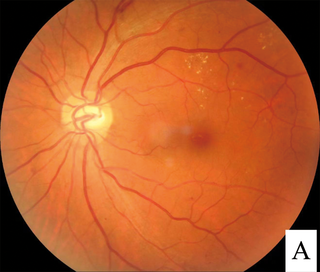
Diabetic retinopathy, is a medical condition in which damage occurs to the retina due to diabetes mellitus. It is a leading cause of blindness in developed countries.

Blood glucose monitoring is the use of a glucose meter for testing the concentration of glucose in the blood (glycemia). Particularly important in diabetes management, a blood glucose test is typically performed by piercing the skin to draw blood, then applying the blood to a chemically active disposable 'test-strip'. The other main option is continuous glucose monitoring (CGM). Different manufacturers use different technology, but most systems measure an electrical characteristic and use this to determine the glucose level in the blood. Skin-prick methods measure capillary blood glucose, whereas CGM correlates interstitial fluid glucose level to blood glucose level. Measurements may occur after fasting or at random nonfasting intervals, each of which informs diagnosis or monitoring in different ways.

Diabetes UK is a British-based patient, healthcare professional and research charity that has been described as "one of the foremost diabetes charities in the UK". The charity campaigns for improvements in the care and treatment of people with diabetes.

Type 1 diabetes (T1D), formerly known as juvenile diabetes, is an autoimmune disease that originates when cells that make insulin are destroyed by the immune system. Insulin is a hormone required for the cells to use blood sugar for energy and it helps regulate glucose levels in the bloodstream. Before treatment this results in high blood sugar levels in the body. The common symptoms of this elevated blood sugar are frequent urination, increased thirst, increased hunger, weight loss, and other serious complications. Additional symptoms may include blurry vision, tiredness, and slow wound healing. Symptoms typically develop over a short period of time, often a matter of weeks if not months.
The term diabetes includes several different metabolic disorders that all, if left untreated, result in abnormally high concentrations of a sugar called glucose in the blood. Diabetes mellitus type 1 results when the pancreas no longer produces significant amounts of the hormone insulin, usually owing to the autoimmune destruction of the insulin-producing beta cells of the pancreas. Diabetes mellitus type 2, in contrast, is now thought to result from autoimmune attacks on the pancreas and/or insulin resistance. The pancreas of a person with type 2 diabetes may be producing normal or even abnormally large amounts of insulin. Other forms of diabetes mellitus, such as the various forms of maturity-onset diabetes of the young, may represent some combination of insufficient insulin production and insulin resistance. Some degree of insulin resistance may also be present in a person with type 1 diabetes.
Desmond or Desmond's may refer to:
Nursing in the United Kingdom has a long history. The current form of nursing is often considered as beginning with Florence Nightingale who pioneered modern nursing. Nightingale initiated formal schools of nursing in the United Kingdom in the late 19th and early 20th centuries. The role and perception of nursing has dramatically changed from that of a handmaiden to the doctor to professionals in their own right. There are over 700,000 nurses in the United Kingdom and they work in a variety of settings, such as hospitals, health centres, nursing homes, hospices, communities, and academia, with most working for the National Health Service (NHS). Nurses work across all demographics and requirements of the public: adults, children, mental health, and learning disability. Nurses work in a range of specialties from the broad areas of medicine, surgery, theatres, and investigative sciences such as imaging. Nurses also work in large areas of sub-specialities such as respiratory, diabetes, neurology, infectious diseases, liver, research, cardiac, and stoma. Nurses often work in multi-disciplinary teams but increasingly are found working independently.
A diabetic diet is a diet that is used by people with diabetes mellitus or high blood sugar to minimize symptoms and dangerous complications of long-term elevations in blood sugar.
HIV/AIDS was first diagnosed in 1981. As of year-end 2018, 160,493 people have been diagnosed with HIV in the United Kingdom and an estimated 7,500 people are living undiagnosed with HIV. New diagnoses are highest in gay/bisexual men, with an estimated 51% of new diagnosis reporting male same-sex sexual activity as the probable route of infection. Between 2009 and 2018 there was a 32% reduction in new HIV diagnosis, attributed by Public Health England (PHE) to better surveillance and education. PHE has described an "outbreak" in Glasgow amongst people who inject drugs, and has campaigns targeting men who have sex with men in London and other major cities. London was the first city in the world to reach the World Health Organization target for HIV, set at 90% of those with HIV diagnosed, 90% of those diagnosed on HAART and 90% of those on HAART undetectable. The UK as a whole later achieved the same target. Under the Equality Act 2010, it is illegal to discriminate against someone based on their HIV status in the UK.
Richard K. Bernstein is a physician and an advocate for a low-carbohydrate diabetes diet to help achieve normal blood sugars for diabetics. Bernstein has type 1 diabetes. His private medical practice in Mamaroneck, New York is devoted solely to treating diabetes and prediabetes.
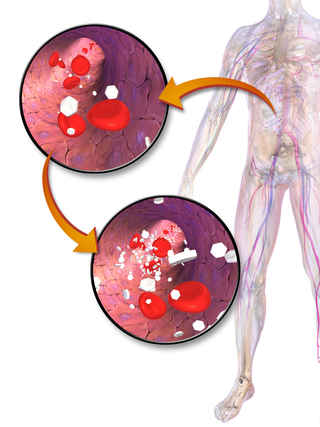
Prediabetes is a component of the metabolic syndrome and is characterized by elevated blood sugar levels that fall below the threshold to diagnose diabetes mellitus. It usually does not cause symptoms but people with prediabetes often have obesity, dyslipidemia with high triglycerides and/or low HDL cholesterol, and hypertension. It is also associated with increased risk for cardiovascular disease (CVD). Prediabetes is more accurately considered an early stage of diabetes as health complications associated with type 2 diabetes often occur before the diagnosis of diabetes.
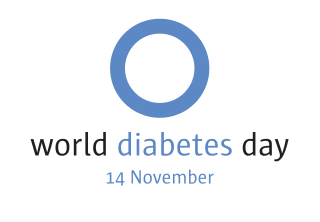
World Diabetes Day is the primary global awareness campaign focusing on diabetes mellitus and is held on 14 November each year.
Health in the United Kingdom refers to the overall health of the population of the United Kingdom. This includes overall trends such as life expectancy and mortality rates, mental health of the population and the suicide rate, smoking rates, alcohol consumption, prevalence of diseases within the population and obesity in the United Kingdom. Three of these – smoking rates, alcohol consumption and obesity – were above the OECD average in 2015.
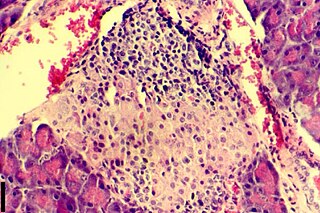
Insulitis is an inflammation of the islets of Langerhans, a collection of endocrine tissue located in the pancreas that helps regulate glucose levels, and is classified by specific targeting of immune cell infiltration in the islets of Langerhans. This immune cell infiltration can result in the destruction of insulin-producing beta cells of the islets, which plays a major role in the pathogenesis, the disease development, of type 1 and type 2 diabetes. Insulitis is present in 19% of individuals with type 1 diabetes and 28% of individuals with type 2 diabetes. It is known that genetic and environmental factors contribute to insulitis initiation, however, the exact process that causes it is unknown. Insulitis is often studied using the non-obese diabetic (NOD) mouse model of type 1 diabetes. The chemokine family of proteins may play a key role in promoting leukocytic infiltration into the pancreas prior to pancreatic beta-cell destruction.

Globally, an estimated 537 million adults are living with diabetes, according to 2019 data from the International Diabetes Federation. Diabetes was the 9th-leading cause of mortality globally in 2020, attributing to over 2 million deaths annually due to diabetes directly, and to kidney disease due to diabetes. The primary causes of type 2 diabetes is diet and physical activity, which can contribute to increased BMI, poor nutrition, hypertension, alcohol use and smoking, while genetics is also a factor. Diabetes prevalence is increasing rapidly; previous 2019 estimates put the number at 463 million people living with diabetes, with the distributions being equal between both sexes icidence peaking around age 55 years old. The number is projected to 643 million by 2030, or 7079 individuals per 100,000, with all regions around the world continue to rise. Type 2 diabetes makes up about 85-90% of all cases. Increases in the overall diabetes prevalence rates largely reflect an increase in risk factors for type 2, notably greater longevity and being overweight or obese. The prevalence of African Americans with diabetes is estimated to triple by 2050, while the prevalence of whites is estimated to double. The overall prevalence increases with age, with the largest increase in people over 65 years of age. The prevalence of diabetes in America is estimated to increase to 48.3 million by 2050.

Diabetes mellitus, often known simply as diabetes, is a group of common endocrine diseases characterized by sustained high blood sugar levels. Diabetes is due to either the pancreas not producing enough insulin, or the cells of the body becoming unresponsive to the hormone's effects. Classic symptoms include thirst, polyuria, weight loss, and blurred vision. If left untreated, the disease can lead to various health complications, including disorders of the cardiovascular system, eye, kidney, and nerves. Untreated or poorly treated diabetes accounts for approximately 1.5 million deaths every year.
Diabetes.co.uk is a British-based website that offers news, information and resources on diabetes, describing itself as "Europe's largest community of people with diabetes".
Stephanie Anne Amiel, Lady Alberti, is a British physician and academic, specialising in type 1 diabetes. Since 1995, she has been the R. D. Lawrence Professor of Diabetic Medicine at King's College London and a consultant at King's College Hospital.
Elizabeth Murray was a British general practitioner and professor of e-health and primary care at University College London. In 2003 she established the eHealth Unit at UCL where she was co-director, and she was also Deputy Director of the UCL Institute of Healthcare Engineering.
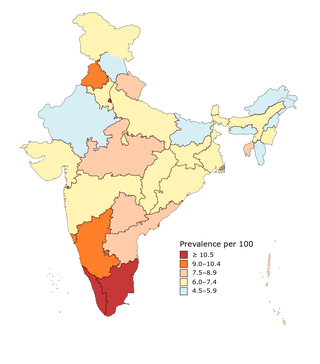
India has an estimated 77 million people formally diagnosed with diabetes, which makes it the second most affected in the world, after China. Furthermore, 700,000 Indians died of diabetes, hyperglycemia, kidney disease or other complications of diabetes in 2020. One in six people (17%) in the world with diabetes is from India. The number is projected to grow by 2045 to become 134 million per the International Diabetes Federation.
References
- ↑ "Tudo sobre Diabetes" . Retrieved 2018-01-29.
- NHS DESMOND homepage
- NHS NICE criteria for diabetes training courses